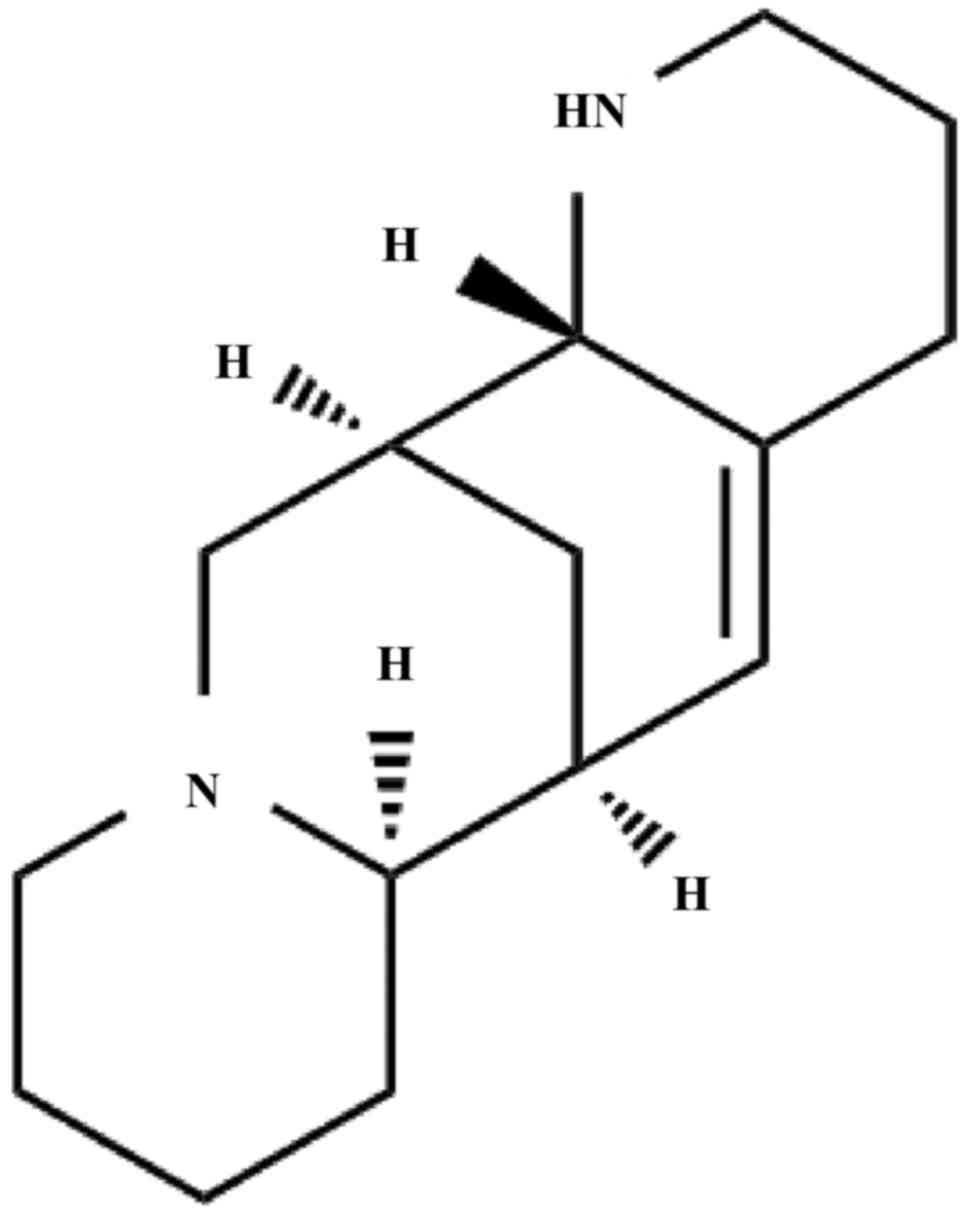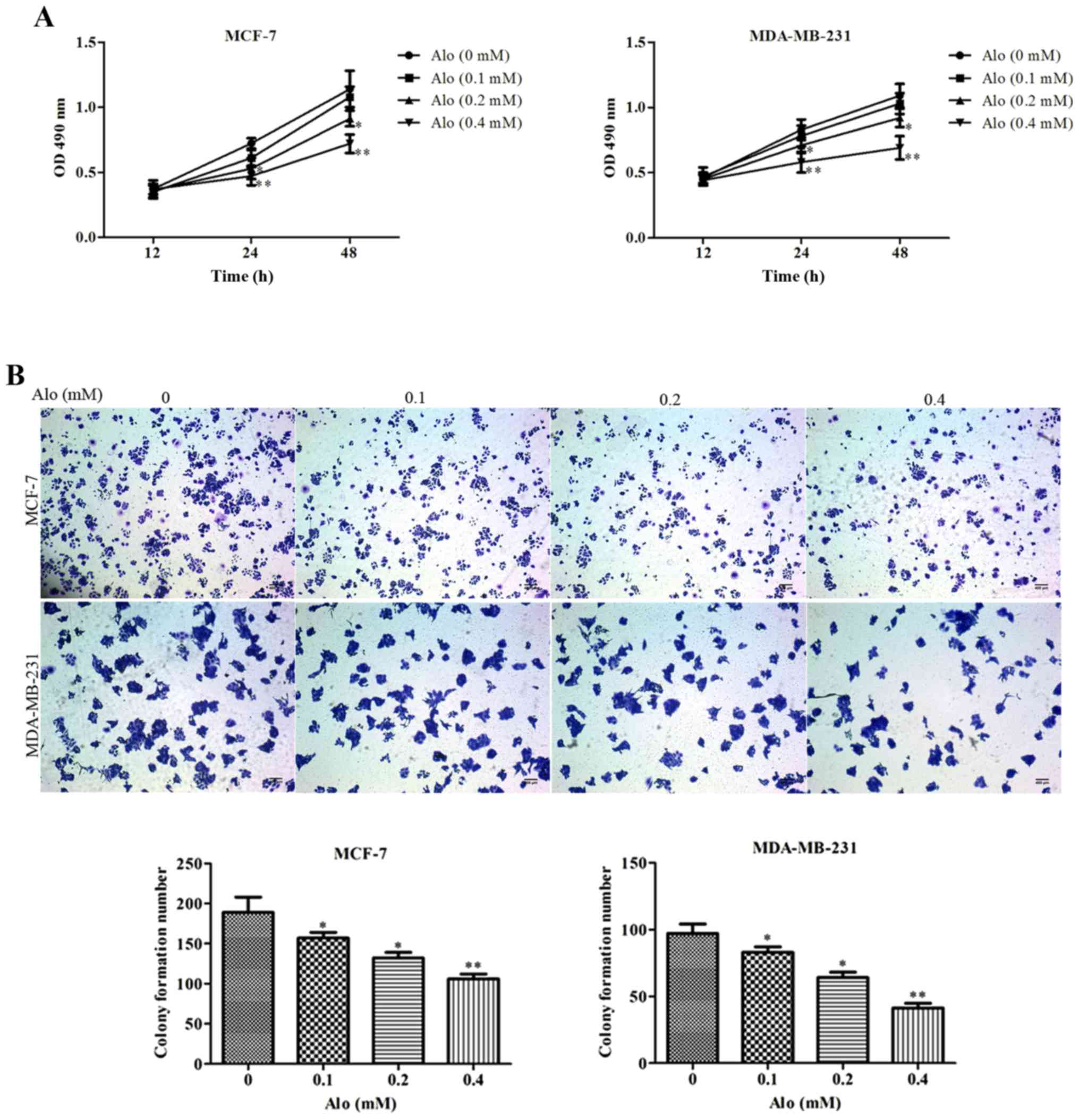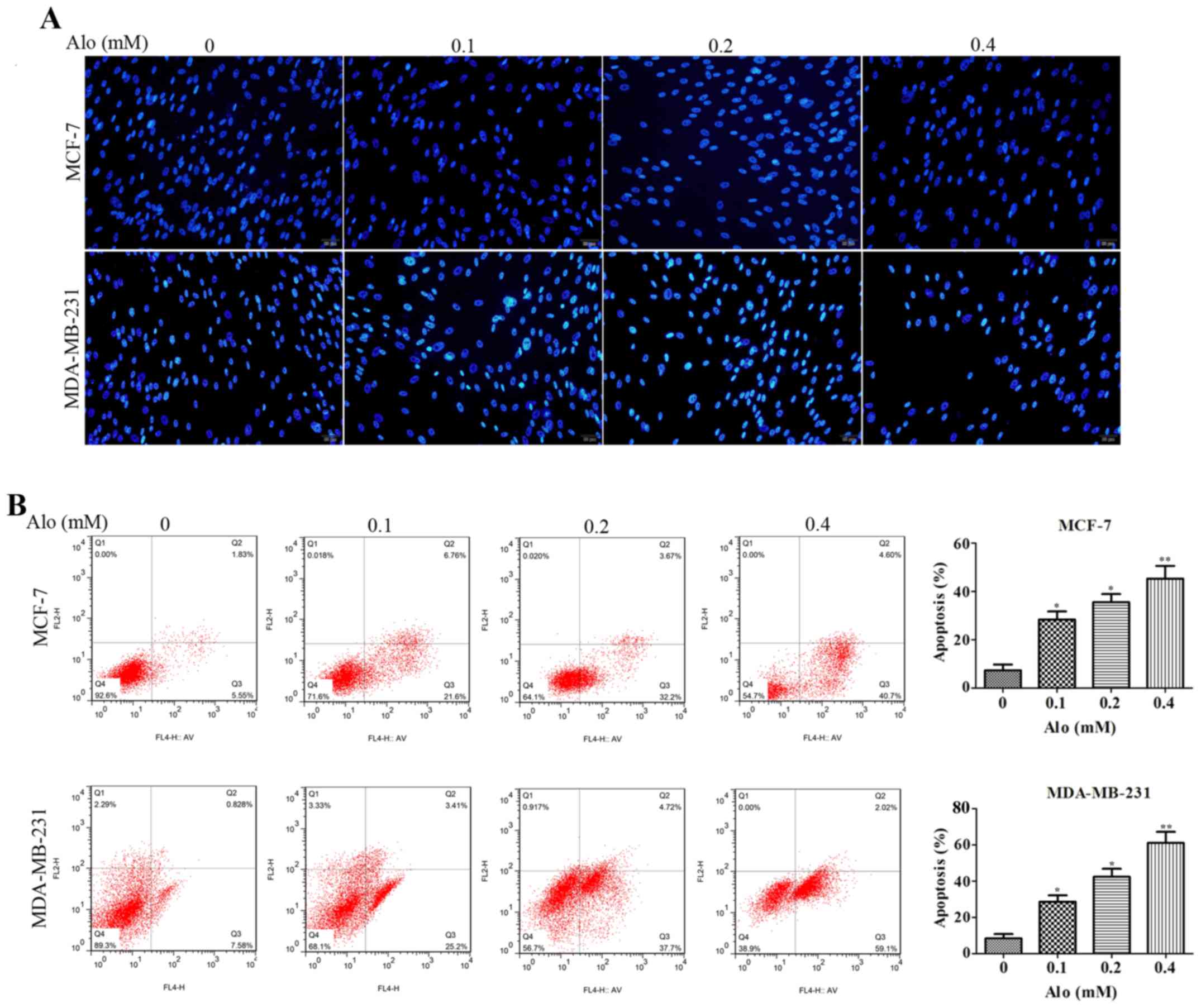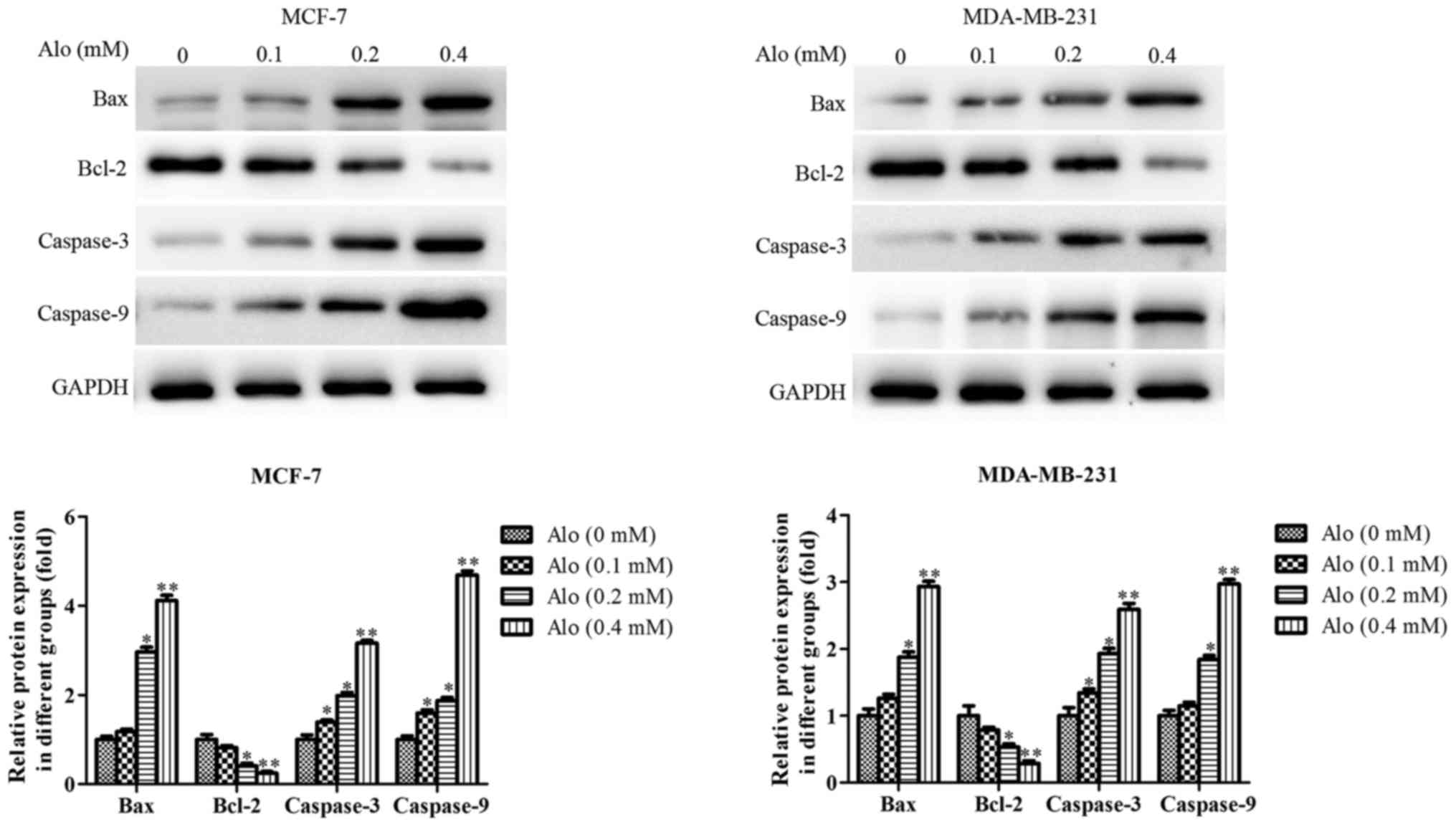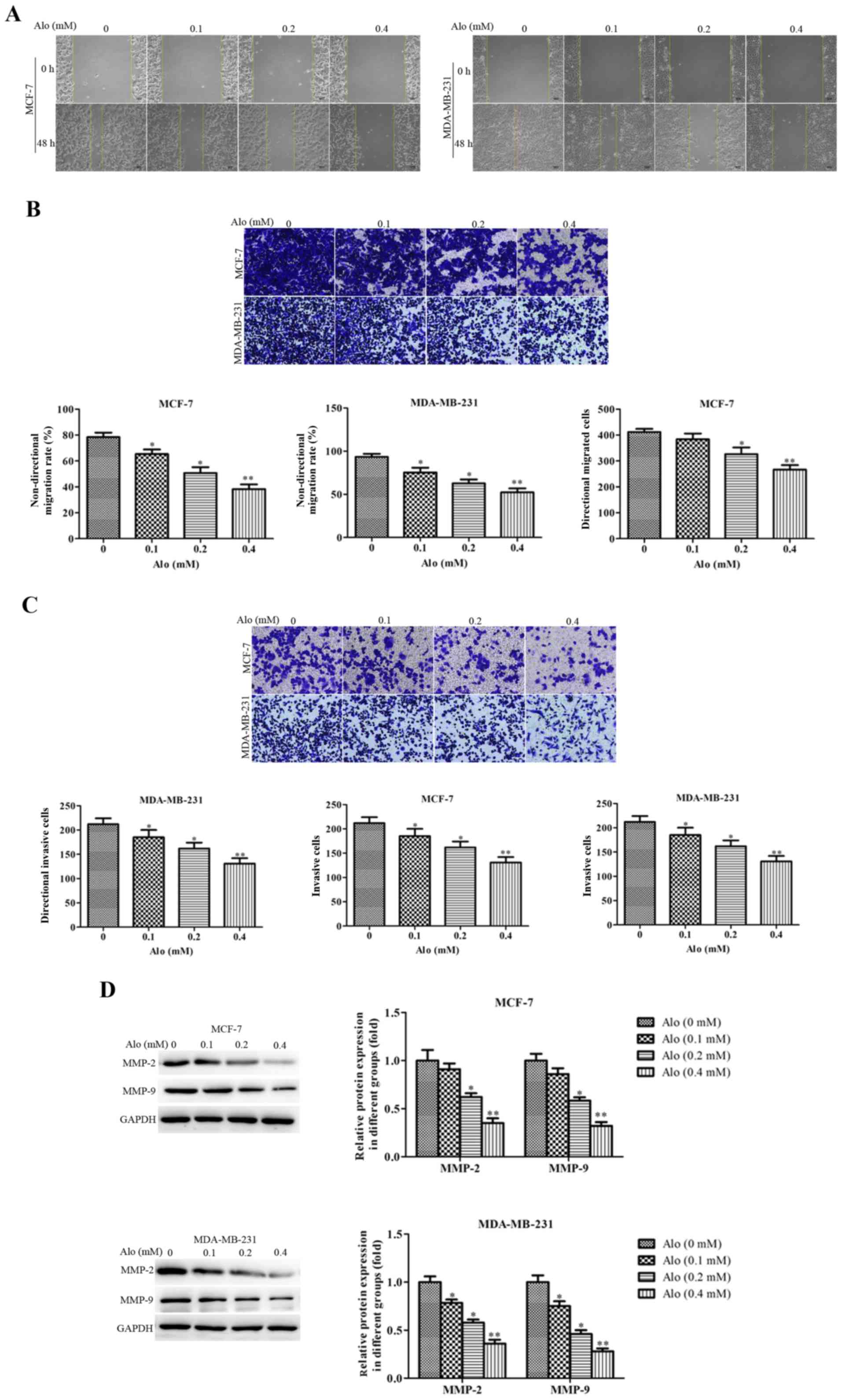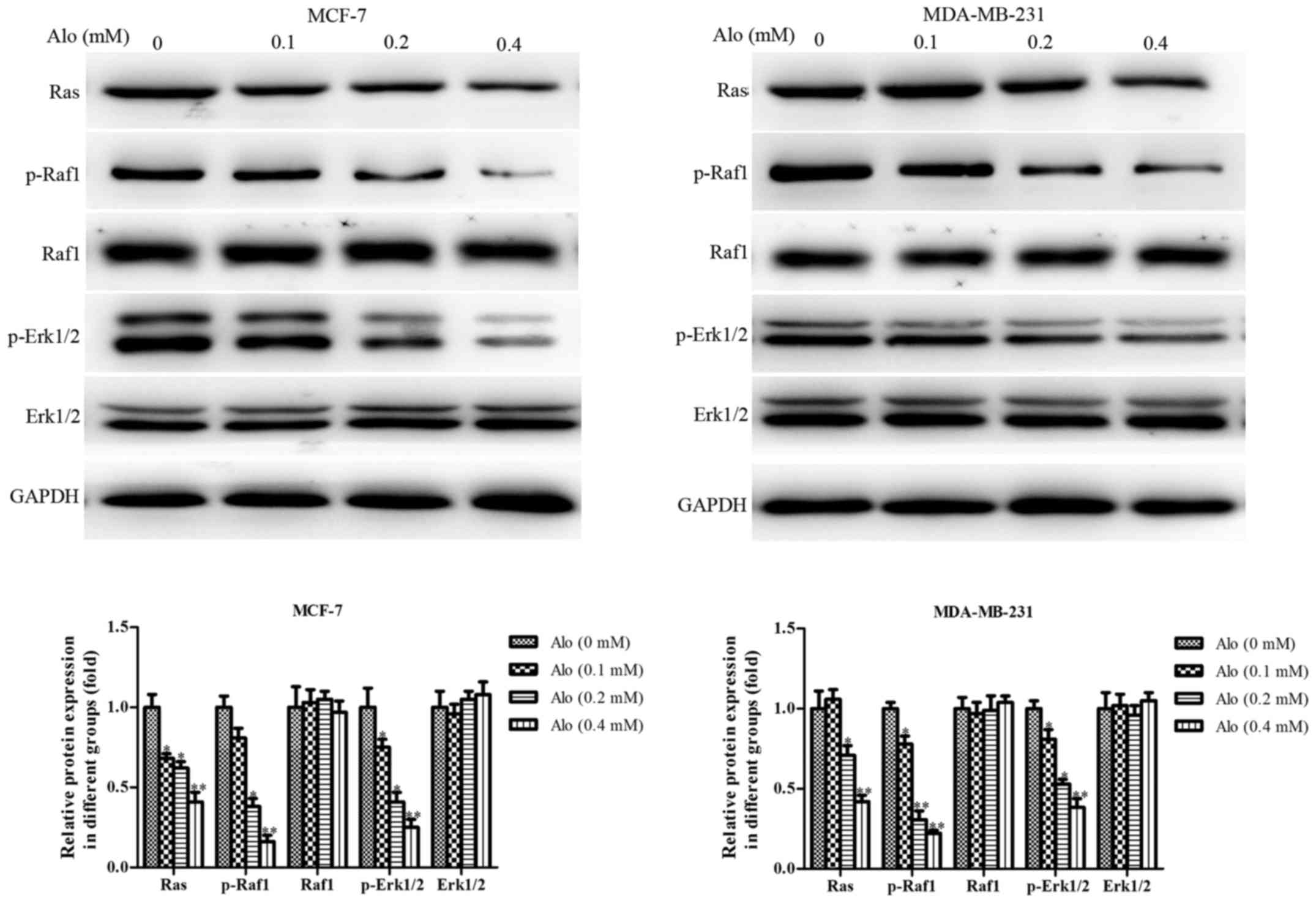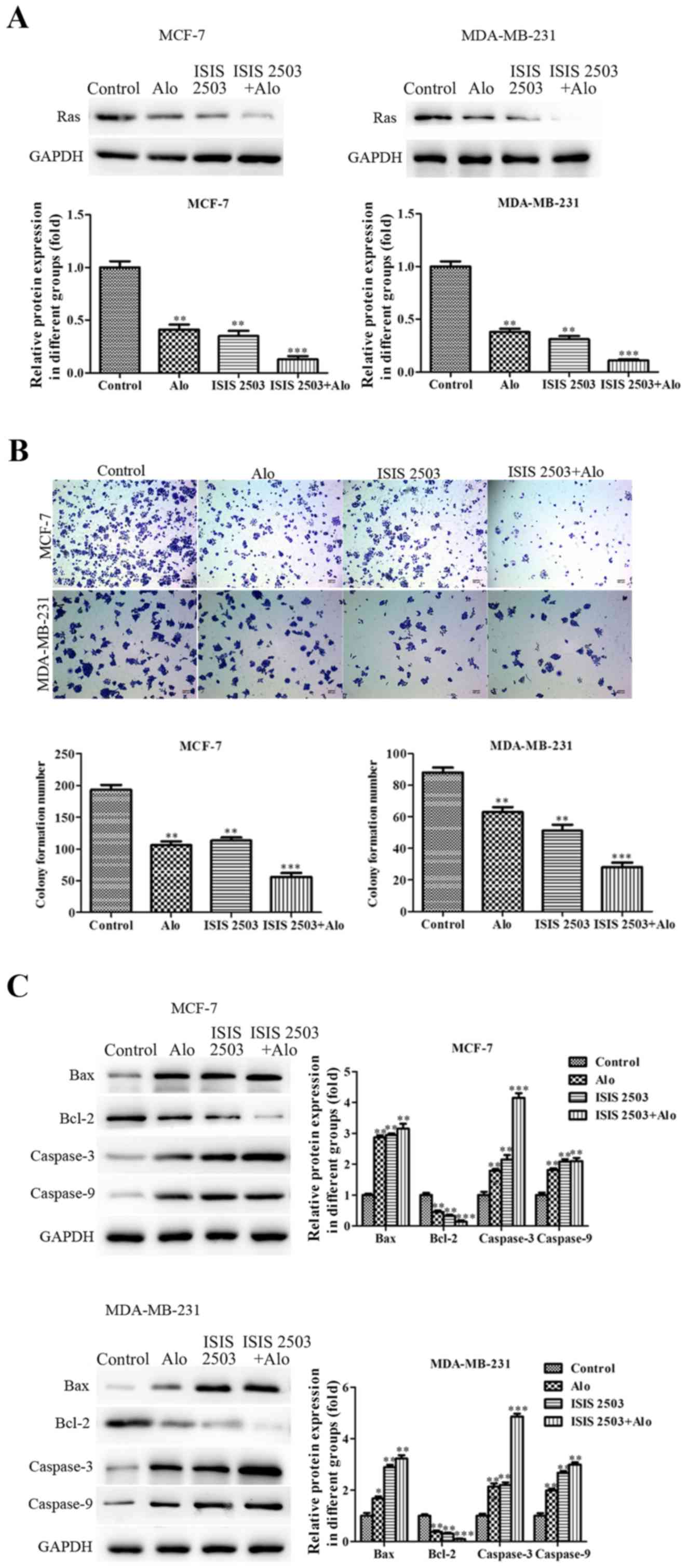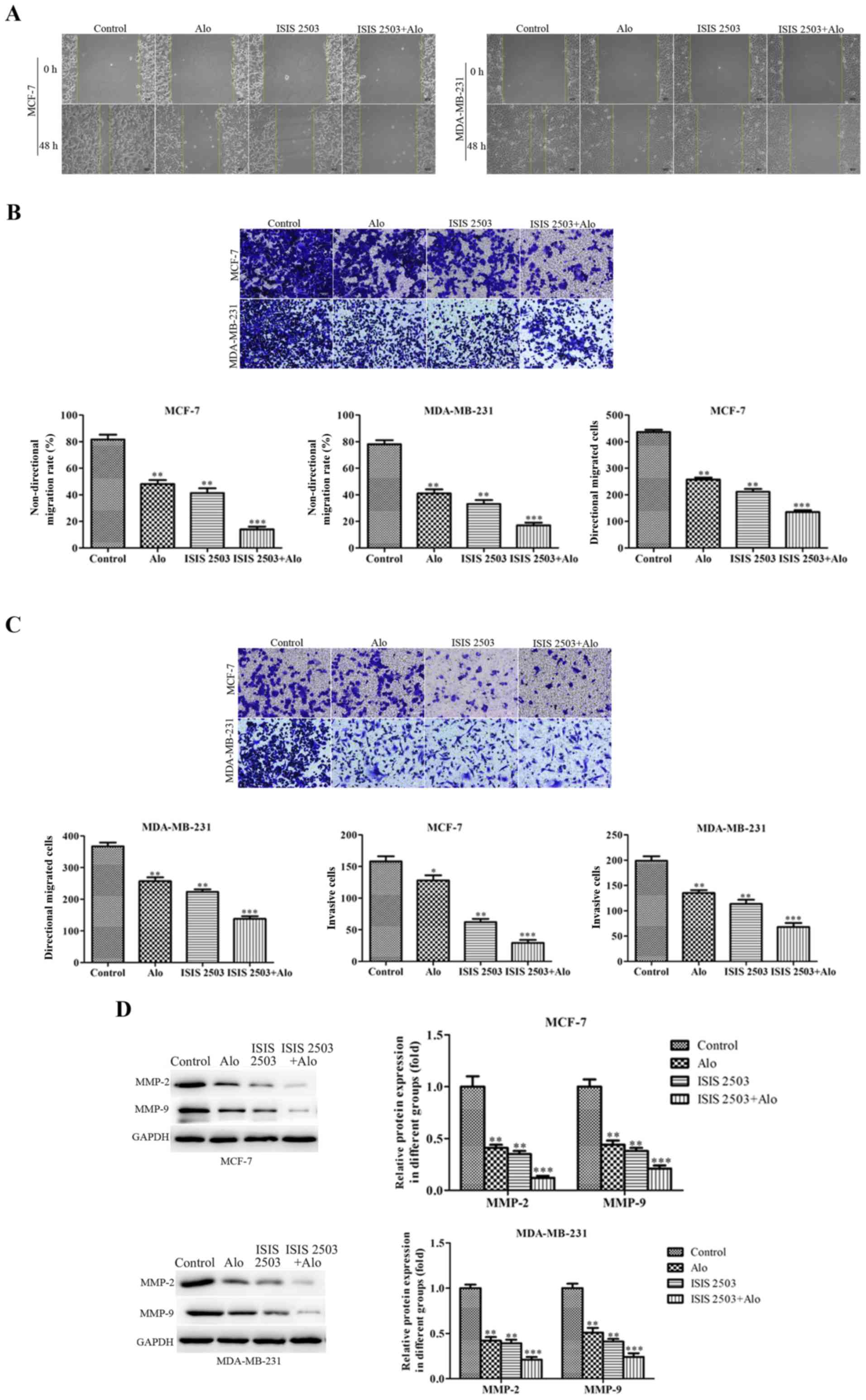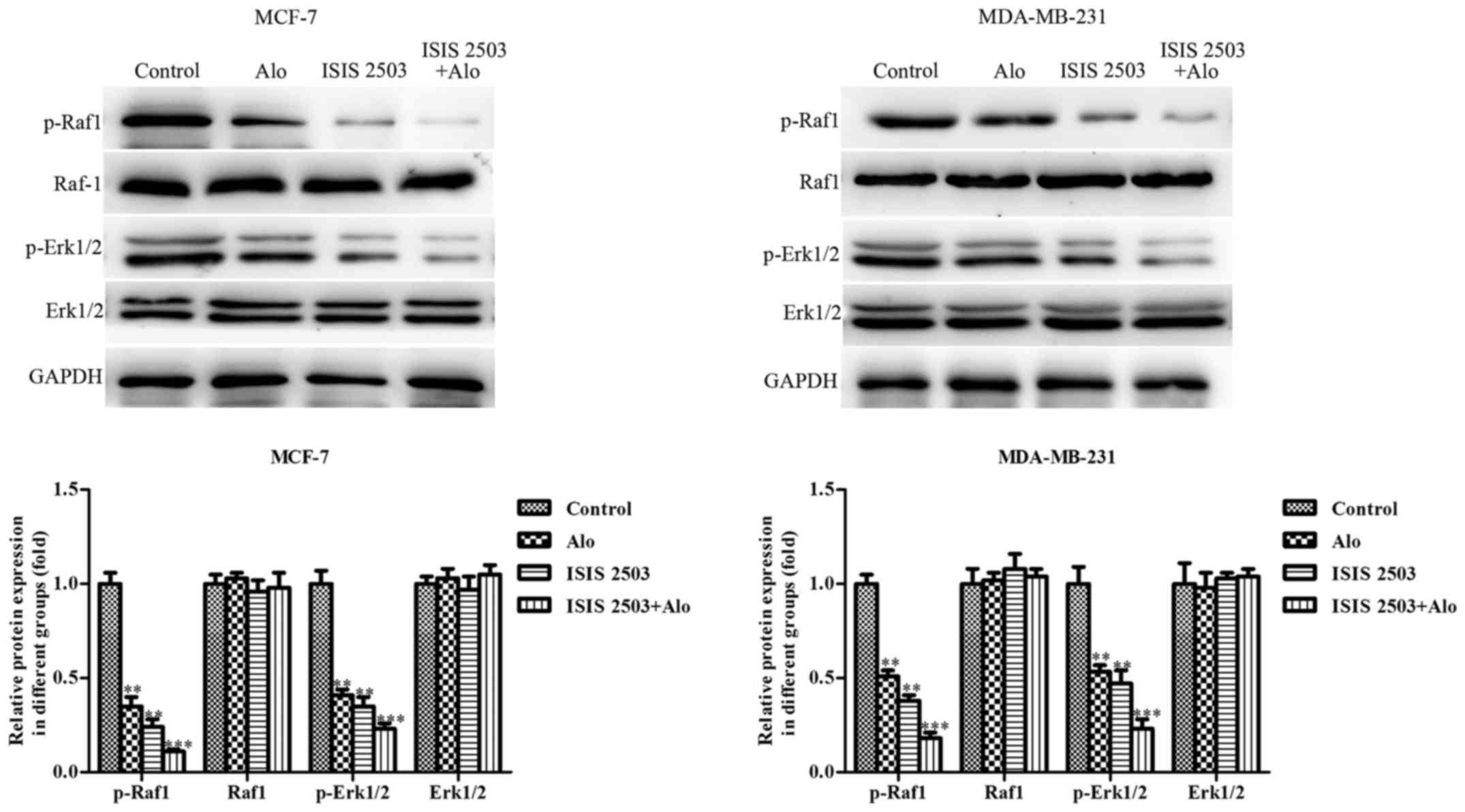|
1
|
Torre LA, Bray F, Siegel RL, Ferlay J,
Lortet-Tieulent J and Jemal A: Global cancer statistics, 2012. CA
Cancer J Clin. 65:87–108. 2015. View Article : Google Scholar : PubMed/NCBI
|
|
2
|
Siegel RL, Miller KD and Jemal A: Cancer
statistics, 2015. CA Cancer J Clin. 65:5–29. 2015. View Article : Google Scholar : PubMed/NCBI
|
|
3
|
DeSantis C, Ma J, Bryan L and Jemal A:
Breast cancer statics, 2013. CA Cancer J Clin. 64:52–62. 2014.
View Article : Google Scholar : PubMed/NCBI
|
|
4
|
DeSantis CE, Bray F, Ferlay J,
Lortet-Tieulent J, Anderson BO and Jemal A: International variation
in female breast cancer incidence and mortality rates. Cancer
Epidemiol Biomarkers Prev. 24:1495–1506. 2015. View Article : Google Scholar : PubMed/NCBI
|
|
5
|
Fan L, Zheng Y, Yu KD, Liu GY, Wu J, Lu
JS, Shen KW, Shen ZZ and Shao ZM: Breast cancer in a transitional
society over 18 years: Trends and present status in Shanghai,
China. Breast Cancer Res Treat. 117:409–416. 2009. View Article : Google Scholar : PubMed/NCBI
|
|
6
|
Kamal A, Lakshma Nayak V, Nagesh N,
Vishnuvardan MV and Subba Reddy NV: Benzo[b]furan derivatives
induces apoptosis by targeting the PI3K/Akt/mTOR signaling pathway
in human breast cancer cells. Bioorg Chem. 66:124–131. 2016.
View Article : Google Scholar : PubMed/NCBI
|
|
7
|
Khpal M, Miller JRC, Petrovic Z and
Hassanally D: Local anesthetic delivery via surgical drain provides
improved pain control versus direct skin infiltration following
axillary node dissection for breast cancer. Breast Cancer.
25:185–190. 2018. View Article : Google Scholar : PubMed/NCBI
|
|
8
|
Lauberg T, Tramm T, Nielsen T, Alsner J,
Nord S, Myhre S, Sørlie T, Leung S, Fan C, Perou C, et al:
Intrinsic subtypes and benefit from postmastectomy radiotherapy in
node-positive premenopausal breast cancer patients who received
adjuvant chemotherapy-results from two independent randomized
trials. Acta Oncol. 25:38–43. 2018. View Article : Google Scholar
|
|
9
|
Ito K, Park SH, Katsyv I, Zhang W, De
Angelis C, Schiff R and Lrie HY: PTK6 regulates growth and survival
of endocrine therapy-resistant ER+ breast cancer cells. NPJ Breast
Cancer. 3:452017. View Article : Google Scholar : PubMed/NCBI
|
|
10
|
Sui Y, Zhang X, Yang H, Wei W and Wang M:
MicroRNA-133a acts as a tumour suppressor in breast cancer through
targeting LASP1. Oncol Rep. 39:473–482. 2018.PubMed/NCBI
|
|
11
|
Zhang J, Yu K, Han X, Zhen L, Liu M, Zhang
X, Ren Y and Shi J: Paeoniflorin influences breast cancer cell
proliferation and invasion via inhibition of the Notch-1 signaling
pathway. Mol Med Rep. 17:1321–1325. 2018.PubMed/NCBI
|
|
12
|
Wu C, Sun Z, Guo B, Ye Y, Han X, Qin Y and
Liu S: Osthole inhibits bone metastasis of breast cancer.
Oncotarget. 8:58480–58493. 2017.PubMed/NCBI
|
|
13
|
Huang C, Lu CK, Tu MC, Chang JH, Chen YJ,
Tu YH and Huang HC: Polyphenol-rich Avicennia marina leaf extracts
induce apoptosis in human breast and liver cancer cells and in a
nude mouse xenograft model. Oncotarget. 7:35874–35893.
2016.PubMed/NCBI
|
|
14
|
Zhou WJ, Wang S, Hu Z, Zhou ZY and Song
CJ: Angelica sinensis polysaccharides promotes apoptosis in human
breast cancer cells via CREB-regulated caspase-3 activation.
Biochem Biophys Res Commun. 467:562–569. 2015. View Article : Google Scholar : PubMed/NCBI
|
|
15
|
Wang H, Guo S, Qian D, Qian Y and Duan JA:
Comparative analysis of quinolizidine alkaloids from different
parts of Sophora alopecuroides seeds by UPLC-MS/MS. J Pharm Biomed
Anal 67–68. 1–21. 2012. View Article : Google Scholar
|
|
16
|
Yuan XY, Liu W, Zhang P, Wang RY and Guo
JY: Effects and mechanisms of aloperine on 2,
4-dinitrofluorobenzene-induced allergic contact dermatitis in
BALB/c mice. Eur J Pharmacol. 629:147–152. 2010. View Article : Google Scholar : PubMed/NCBI
|
|
17
|
Chen S, Jin Z, Dai L, Wu H, Wang J, Wang
L, Zhou Z, Yang L and Gao W: Aloperine induces apoptosis and
inhibits invasion in MG-63 and U2OS human osteosarcoma cells.
Biomed Pharmacother. 97:45–52. 2018. View Article : Google Scholar : PubMed/NCBI
|
|
18
|
Zhang L, Zheng Y, Deng H, Liang L and Peng
J: Aloperine induces G2/M phase cell cycle arrest and apoptosis in
HCT116 human colon cancer cells. Int J Mol Med. 33:1613–1620. 2014.
View Article : Google Scholar : PubMed/NCBI
|
|
19
|
Brown GT and Murray GI: Current
mechanistic insights into the roles of matrix metalloproteinases in
tumour invasion and metastasis. J Pathol. 237:273–281. 2015.
View Article : Google Scholar : PubMed/NCBI
|
|
20
|
Folgueras AR, Pendás AM, Sánchez LM and
López-Otín C: Matrix metalloproteinases in cancer: From new
functions to improved inhibition strategies. Int J Dev Biol.
48:411–424. 2004. View Article : Google Scholar : PubMed/NCBI
|
|
21
|
Yang Q, Ji M, Guan H, Shi B and Hou P:
Shikonin inhibits thyroid cancer cell growth and invasiveness
through targeting major signaling pathways. J Clin Endocrinol
Metab. 98:E1909–E1917. 2013. View Article : Google Scholar : PubMed/NCBI
|
|
22
|
Zhang XG, Lu XF, Jiao XM, Chen B and Wu
JX: PLK1 gene suppresses cell invasion of undifferentiated thyroid
carcinoma through the inhibition of CD44v6, MMP-2 and MMP-9. Exp
Ther Med. 4:1005–1009. 2012. View Article : Google Scholar : PubMed/NCBI
|
|
23
|
Downward J: Targeting RAS signalling
pathways in cancer therapy. Nat Rev Cancer. 3:11–22. 2003.
View Article : Google Scholar : PubMed/NCBI
|
|
24
|
Hilger RA, Scheulen ME and Strumberg D:
The Ras-Raf-MEK-ERK pathway in the treatment of cancer. Onkologie.
25:511–518. 2002.PubMed/NCBI
|
|
25
|
Friday BB and Adjei AA: Advances in
targeting the Ras/Raf/MEK/Erk mitogen-activated protein kinase
cascade with MEK inhibitors for cancer therapy. Clin Cancer Res.
14:342–346. 2008. View Article : Google Scholar : PubMed/NCBI
|
|
26
|
Dancey JE: Agents targeting ras signaling
pathway. Curr Pharm Des. 8:2259–2267. 2002. View Article : Google Scholar : PubMed/NCBI
|
|
27
|
Adjei AA, Dy GK, Erlichman C, Reid JM,
Sloan JA, Pitot HC, Alberts SR, Goldberg RM, Hanson LJ, Atherton
PJ, et al: A phase I trial of ISIS 2503, an antisense inhibitor of
H-ras, in combination with gemcitabine in patients with advanced
cancer. Clin Cancer Res. 9:115–123. 2003.PubMed/NCBI
|
|
28
|
Brackstone M, Townson JL and Chambers AF:
Tumor dormancy in breast cancer: An update. Breast Cancer Res.
9:2082007. View
Article : Google Scholar : PubMed/NCBI
|
|
29
|
Huang KW, Wu HL, Lin HL, Liang PC, Chen
PJ, Chen SH, Lee HI, Su PY, Wu WH, Lee PH, et al: Combining
antiangiogenic therapy with immunotherapy exerts better
therapeutical effects on large tumors in a woodchuck hepatoma
model. Proc Natl Acad Sci USA. 107:pp. 14769–14774. 2010;
View Article : Google Scholar : PubMed/NCBI
|
|
30
|
Chen Y, Hao H, He S, Cai L, Li Y, Hu S, Ye
D, Hoidal J, Wu P and Chen X: Lipoxin A4 and its analogue suppress
the tumor growth of transplanted H22 in mice: The role of
antiangiogenesis. Mol Cancer Ther. 9:2164–2174. 2010. View Article : Google Scholar : PubMed/NCBI
|
|
31
|
Banerjee S, A'Hern R, Detre S,
Littlewood-Evans AJ, Evans DB, Dowsett M and Martin LA: Biological
evidence for dual antiangiogenic-antiaromatase activity of the
VEGFR inhibitor PTK787/ZK222584 in vivo. Clin Cancer Res.
16:4178–4187. 2010. View Article : Google Scholar : PubMed/NCBI
|
|
32
|
Vaux DL and Korsmeyer SJ: Cell death in
development. Cell. 96:245–254. 1999. View Article : Google Scholar : PubMed/NCBI
|
|
33
|
Ackler S, Mitten MJ, Foster K, Oleksijew
A, Refici M, Tahir SK, Xiao Y, Tse C, Frost DJ, Fesik SW, et al:
The Bcl-2 inhibitor ABT-263 enhances the response of multiple
chemotherapeutic regimens in hematologic tumors in vivo. Cancer
Chemother Pharmacol. 66:869–880. 2010. View Article : Google Scholar : PubMed/NCBI
|
|
34
|
Edelstein ML, Abedi MR and Wixon J: Gene
therapy clinical trials worldwide to 2007-an update. J Gene Med.
9:833–842. 2007. View
Article : Google Scholar : PubMed/NCBI
|
|
35
|
Westermarck J and Kähäri VM: Regulation of
matrix metalloproteinase expression in tumor invasion. FASEB J.
13:781–792. 1999. View Article : Google Scholar : PubMed/NCBI
|
|
36
|
Liu X, Zhao W, Wang W, Lin S and Yang L:
Puerarin suppresses LPS-induced breast cancer cell migration,
invasion and adhesion by blockage NF-κB and Erk pathway. Biomed
Pharmacother. 92:429–436. 2017. View Article : Google Scholar : PubMed/NCBI
|
|
37
|
Kim D, Kim SY, Lee JS, Hong YS, Kim JE,
Kim KP, Kim J, Jang SJ, Yoon YK and Kim TW: Primary tumor location
predicts poor clinical outcome with cetuximab in RAS wild-type
metastatic colorectal cancer. BMC Gastroenterol. 17:1212017.
View Article : Google Scholar : PubMed/NCBI
|
|
38
|
Zhou J, Zhang S, Chen X, Zheng X, Yao Y,
Lu G and Zhou J: Palbociclib, a selective CDK4/6 inhibitor,
enhances the effect of selumetinib in RAS-driven non-small cell
lung cancer. Cancer Lett. 408:130–137. 2017. View Article : Google Scholar : PubMed/NCBI
|
|
39
|
Wang Z, Ma L, Su M, Zhou Y, Mao K, Li C,
Peng G, Zhou C, Shen B and Dou J: Baicalin induces cellular
senescence in human colon cancer cells via upregulation of DEPP and
the activation of Ras/Raf/MEK/ERK signaling. Cell Death Dis.
9:2172018. View Article : Google Scholar : PubMed/NCBI
|
|
40
|
Pan Q, Liu R, Banu H, Ma L and Li H:
Inhibition of isoprenylcysteine carboxylmethyltransferase
sensitizes common chemotherapies in cervical cancer via
Ras-dependent pathway. Biomed Pharmacother. 99:169–175. 2018.
View Article : Google Scholar : PubMed/NCBI
|
|
41
|
Yu SH, Wang TH and Au LC: Specific
repression of mutant K-Ras by 10–23 DNAzyme: Sensitizing cancer
cell to anti-cancer therapies. Biochem Biophys Res Commun.
378:230–234. 2009. View Article : Google Scholar : PubMed/NCBI
|
|
42
|
Bolchi C, Pallavicini M, Rusconi C,
Diomede L, Ferri N, Corsini A, Fumagalli L, Pedretti A, Vistoli G
and Valoti E: Peptidomimetic inhibitors of farnesyltransferase with
high in vitro activity and significant cellular potency. Bioorg Med
Chem Lett. 17:6192–6196. 2007. View Article : Google Scholar : PubMed/NCBI
|















